2017北京中考英语复习三年命题规律总结+中考精炼:第二部分 语言技能专练
2017北京中考英语复习三年命题规律总结代词中考精炼试题 人教版
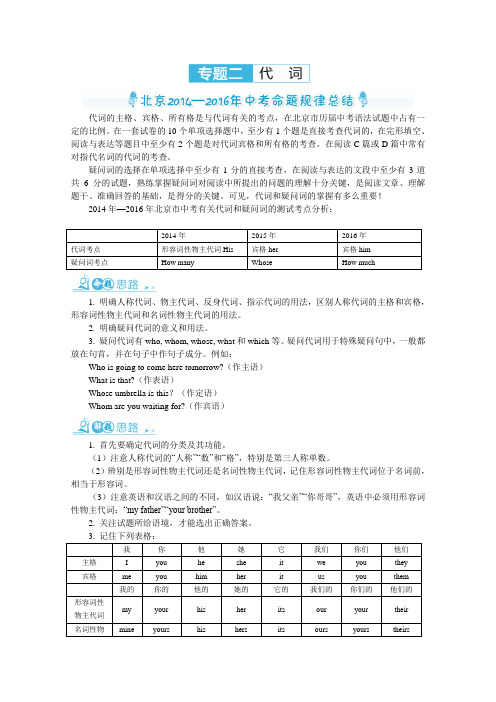
代词的主格、宾格、所有格是与代词有关的考点,在北京市历届中考语法试题中占有一定的比例。
在一套试卷的10个单项选择题中,至少有1个题是直接考查代词的,在完形填空、阅读与表达等题目中至少有2个题是对代词宾格和所有格的考查,在阅读C篇或D篇中常有对指代名词的代词的考查。
疑问词的选择在单项选择中至少有1分的直接考查,在阅读与表达的文段中至少有3道共6分的试题,熟练掌握疑问词对阅读中所提出的问题的理解十分关键,是阅读文章、理解题干、准确回答的基础,是得分的关键。
可见,代词和疑问词的掌握有多么重要!2014年—2016年北京市中考有关代词和疑问词的测试考点分析:1. 明确人称代词、物主代词、反身代词、指示代词的用法,区别人称代词的主格和宾格,形容词性物主代词和名词性物主代词的用法。
2. 明确疑问代词的意义和用法。
3. 疑问代词有who, whom, whose, what和which等。
疑问代词用于特殊疑问句中,一般都放在句首,并在句子中作句子成分。
例如:Who is going to come here tomorrow?(作主语)What is that?(作表语)Whose umbrella is this?(作定语)Whom are you waiting for?(作宾语)1. 首先要确定代词的分类及其功能。
(1)注意人称代词的“人称”“数”和“格”,特别是第三人称单数。
(2)辨别是形容词性物主代词还是名词性物主代词,记住形容词性物主代词位于名词前,相当于形容词。
(3)注意英语和汉语之间的不同,如汉语说:“我父亲”“你哥哥”,英语中必须用形容词性物主代词:“my father”“your brother”。
2. 关注试题所给语境,才能选出正确答案。
1. (2016·北京)My brother will come to see me tomorrow. I’ll meet at the airport.A. herB. youC. himD. themC2. (2015·北京)Miss Smith is very kind. We all like.A. itB. herC. himD. themB3. (2014·北京)I have a big brother. name is Paul.A. HisB. HerC. HeD. YourA4. (2016·绵阳)It is a good habit of to read something before going to bed.A. IB. meC. myD. mineD5. (2016·黄冈)—What do you think of Chinese teacher, Jim?—She’s an excellent teacher. I’ve improved a lot since she taught Chinese.A. our;usB. our;ourC. ours;usD. ours;ourA6. (2016·上海)The retired couple have decided to go to college. It’s time for to begin a new life.A. theyB. themC. theirD. theirsB7. (2016·厦门)—What a great thing to have a robot at home!—Robots are really useful. One day they will help people do almost .A. somethingB. everythingC. nothingB8. (2016·陕西)Good words can touch not only your heart but also .A. IB. myC. myselfD. mineD9. (2016·重庆)—Do you like watching ping-pong matches?—Yes, and favorite ping-pong player is Ma Long.A. weB. usC. ourD. oursC10. (2016·河北)Thanks for inviting to dinner, Nancy. I really enjoyed it.A. herB. himC. youD. meD11. (2016·北京)—are these bananas?—$3. 99.A. How muchB. How longC. How heavyD. How bigA12. (2015·北京)—T-shirt is this?—I think it’s Tom’s.A. WhoseB. WhichC. WhatD. WhoA13. (2014·北京)—people are there in your family?—Three.A. How oftenB. How longC. How manyD. How muchC14. (2016·无锡)—do your parents take exercise, William?—Less than three times a week.A. How longB. How muchC. How soonD. How oftenD15. (2016·济宁)—can you read in English?—About 100 words a minute.A. How farB. How muchC. How fastD. How manyC16. (2016·绵阳)—is the boy with a pair of glasses?—My brother, John.A. HowB. WhoC. WhereD. WhatB17. (2016·绵阳)—can you finish your homework?—In about an hour.A. How longB. How soonC. How oftenD. How farB18. (2016·淮安)—do you go to the Buddy Club in your school?—Twice a month.A. How farB. How longC. How soonD. How oftenD19. (2016·东营)—is your father?—He’s an engineer in a big factory.A. WhoB. WhatC. WhichD. WhereB20. (2016·连云港)—will the 6th Chinese Film Festival in France last?—From May 24th to July 19th.A. How oftenB. How soonC. How longD. How manyCA组1. (2016·东城一模)My aunt lives in Canada. will come back to see us this summer.A. SheB. HeC. TheyD. YouA2. (2016·石景山期末)My brother is good at math. often helps me with my math.A. HeB. SheC. YouD. IA3. (2015·丰台一模)Miss Brown is my English teacher. is from America.A. HeB. SheC. ItD. YouB4. (2015·石景山一模)Tom is a book lover. likes reading very much.A. HeB. SheC. YouD. ItA5. (2015·海淀二模)—Who is that lovely girl?—is my sister.A. SheB. HerC. HeD. HisA6. (2014·石景山二模)Mike lost his key. couldn’t enter the room.A. HeB. SheC. TheyD. ItA7. (2014·平谷二模)Tom and I are good friends. often help each other.A. WeB. UsC. TheyD. ThemAB组1. (2016·顺义一模)—Jim, would you please pass the newspaper? —Here you are.A. meB. herC. himD. themA2. (2016·通州一模)Mrs. Smith is very friendly. We all like .A. meB. youC. herD. himC3. (2016·门头沟二模)—Could you pass that book?—Sure. Here you are.A. IB. myC. meD. mineC4. (2015·海淀一模)My sister Jane is outgoing. We all love very much.A. himB. herC. usD. youB5. (2015·怀柔一模)I’m talking to you, Jack. Please listen to carefully.A. meB. mineC. youD. yoursA6. (2015·丰台二模)The little boy can’t find his mother. Let’s help .A. himB. youC. herD. meA7. (2015·西城一模)Where is Mike?Have you seen?A. heB. himC. hisD. himselfB8. (2015·门头沟一模)—Would you like to go swimming with ? —Yes, I’d love to.A. IB. mineC. myD. meD9. (2015·通州一模)—I can’t find my pen. Could you help find it?—Sure.A. youB. herC. meD. himC10. (2015·顺义二模)I’m going to the cinema. Would you like to go with ?A. meB. IC. myD. mineAC组1. (2016·昌平二模)Look at that girl!She is from England. name is Linda.A. HisB. YourC. ItsD. HerD2. (2016·东城二模)These students always do homework very carefully.A. ourB. hisC. theirD. herC3. (2016·朝阳一模)—Is this your mother’s car?—No. car is blue.A. MyB. HisC. HerD. YourC4. (2016·平谷二模)I often go to the library with friends at weekends.A. IB. myC. meD. mineB5. (2016·门头沟一模)—The boy over there is my new friend.—Oh, really?What’s name?A. heB. sheC. herD. hisD6. (2016·西城一模)—Hi, Peter, is this bike?—Oh, yes. It’s a birthday gift from my parents.A. yourB. myC. hisD. herA7. (2016·房山二模)We all like city because it is clean and beautiful.A. usB. oursC. ourD. weC8. (2016·通州二模)That boy is from England. name is Tom.A. HerB. HisC. YourD. ItsB9. (2015·朝阳二模)I have a sister. name is Lucy.A. HerB. HisC. ItsD. YourA10. (2014·通州一模)We all like math teacher because she is very kind.A. weB. usC. ourD. oursCD组1. (2016·怀柔二模)—Here is a new MP4. Whose is it?—Oh,it’s . Thank you.A. myB. mineC. meD. myselfB2. (2014·大兴一模)My pen doesn’t work well. Could I borrow , John?A. youB. herC. yoursD. hersC3. (2014·顺义一模)—Excuse me, is this your iPad?—No, it isn’t. is at home.A. YoursB. MineC. HisD. HersB4. (2015·雅安一模)This is not my watch. It’s .A. herB. hersC. yourD. mineBE组1. (2016·通州一模)—is your favorite writer?—Lu Xun. I like his books.A. WhoB. WhatC. WhichD. WhoseA2. (2016·门头沟一模)—bag is this?—It’s mine.A. WhoB. WhomC. WhoseD. WhatC3. (2016·朝阳一模)—is your favorite teacher?—Miss Zhang, my English teacher.A. WhoB. WhenC. WhatD. WhereA4. (2016·平谷二模)—is the man in the car?—He is my brother.A. WhyB. WhoC. WhatD. WhichB5. (2016·顺义二模)—is your favorite teacher?—Paul. I like his class.A. WhichB. WhatC. WhoD. WhoseC6. (2015·顺义二模)—schoolbag is this?—I guess it’s Lily’s.A. WhichB. WhoseC. WhatD. WhoB7. (2016·东城一模)—was the movie last night?—It was wonderful.A. WhenB. WhereC. HowD. WhatC8. (2015·丰台一模)—do you do homework, Lily?—About 2 hours.A. How oftenB. How longC. How manyD. How muchB9. (2016·朝阳二模)—do you usually fly kites with your friends?—In the park.A. WhyB. HowC. WhenD. WhereD10. (2016·西城一模)—were you late again?—Because I missed the early bus.A. WhenB. WhereC. HowD. WhyD11. (2016·门头沟二模)—did you last see him?—Yesterday afternoon.A. WhatB. WhenC. WhereD. WhyB12. (2016·通州二模)—books are there on the table?—There are 50 books on the table.A. How longB. How muchC. How manyD. How farC13. (2015·海淀一模)—do you play the guitar?—Three times a week.A. How muchB. How oldC. How longD. How oftenD14. (2015·丰台二模)—is the book?—It’s $6. 95.A. How oldB. How longC. How highD. How muchDA组1. Kate and Alice are good friends. often help each other.A. TheyB. YouC. WeD. TheirsA2. My sister went to the party and had a good time there.A. sheB. IC. herD. meA3. My grandpa often tells interesting stories.A. IB. meC. myD. mineB4. My parents gave a nice toy dog for my birthday.A. IB. mineC. myD. meD5. It’s my mother’s birthday tomorrow. I will buy a CD as a present.A. himB. herC. meD. youB6. We are going to play basketball. Would you like to go with ?A. usB. weC. ourD. oursA7. Mr. Wang is very friendly, and like him very much.A. ourB. oursC. weD. usC8. —Bill, where’s your father?He didn’t take his phone with .—I don’t know, Mom!A. heB. hisC. himD. herC9. Where’s Dad?Mom is looking for .A. himB. herC. meD. themAB组1. —Whose pen is it?—It’s . She is looking for it.A. sheB. herC. hisD. hersD2. —Whose pen is it?—It’s pen. She is looking for it.A. sheB. herC. hisD. hersB3. —Is this your coat, sir?—No. coat is dark blue.A. MeB. MyC. ID. MineB4. —Is this your coat, sir?—No. is dark blue.A. MeB. MyC. ID. MineD5. We all like English teacher because she is very friendly to us.A. weB. usC. ourD. oursC6. —Is this your father’s car?—No. car is black,not white.A. MyB. HisC. HerD. YourB7. —Does Miss White like sports?—Yes,favorite sport is tennis.A. yourB. ourC. hisD. herD8. The lovely boy is my friend. name is Mike.A. HisB. HerC. YourD. ItsA9. —Who’s the man over there?—He is father.A. IB. meC. myD. mineC10. Tom Hanks is a great actor and we love movies.A. heB. hisC. himD. himselfBC组1. —Disney amusement parks are there in China?—Two.A. How manyB. How oftenC. How soonD. How longA2. —is your best friend?—Linda.A. WhatB. WhoC. WhyD. WhereB3. —did your mother get home last night?—At about eleven, I think.A. WhatB. WhereC. WhoD. WhenD4. —are your family going this summer holiday?—To Qingdao. We’ll stay there for a week.A. WhereB. WhenC. HowD. WhyA5. —do you play football?—Once a week.A. How muchB. How longC. How oftenD. How farC6. sweater do you prefer, the yellow one or the green one?A. WhichB. WhoseC. How manyD. How muchA7. —did you have the party last night?—In the park.A. WhatB. WhyC. WhenD. WhereD8. —What a lovely dog! is it?—4 years old.A. How muchB. How heavyC. How longD. How oldD9. —did you come to school this morning, Miss Smith?—By bus.A. HowB. WhenC. WhoD. WhatA10. —bike is that?—It’s my mother’s.A. WhoB. WhomC. WhoseD. WhatC。
北京中考英语三年真题分析
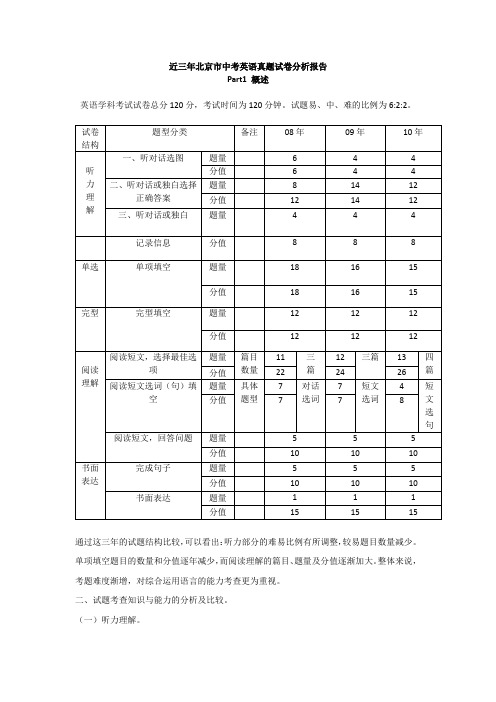
近三年北京市中考英语真题试卷分析报告Part1 概述英语学科考试试卷总分120分,考试时间为120分钟。
试题易、中、难的比例为6:2:2。
通过这三年的试题结构比较,可以看出:听力部分的难易比例有所调整,较易题目数量减少。
单项填空题目的数量和分值逐年减少,而阅读理解的篇目、题量及分值逐渐加大。
整体来说,考题难度渐增,对综合运用语言的能力考查更为重视。
二、试题考查知识与能力的分析及比较。
(一)听力理解。
相比08年,09年和10年听力理解分值变化不大,但是题量加大,09年最多,10年稍有减少,整体的难度也稍微加大。
1、听对话选图题从08年的6道题减少至09年、10年的4道题;2、听对话或独白选择答案的题量从08年到10年逐渐增加。
考查的范围更加广泛,考查学生的日常交流能力和实际运用能力,难度加大。
3、短文填空考查学生对短文的理解能力及提取信息的能力,比08年难度稍大。
(二)单项填空。
题量逐年减少,但是考查的重点项目基本保持一致,但是加强了语言的运用能力,将语法知识与日常生活结合起来,在具体的语言环境中考查语法等语言知识。
充分体现了“淡化语法,注重语言应用和交际”的理念。
从以上表格中可以很容易看出,试题的考查主要从语言知识的运用出发,结合各个方面的语法与能力,覆盖面比较广,注重基础也重视能力运用。
同时,有些重点的项目几乎是每年必考题型。
(三)完型填空。
三年的题量和分值都未变化,但是选择的文章难度有所增加,贴近生活、学习及社会,从中体现出情感、态度及价值观培养的三维目标之一。
主要考查是对实词的掌握,及上下文意义的理解。
考生必须要有相当的词汇量,并且对词义及词性有准确的了解。
动词一直都是考查的重点,而且考查动词的题目连续出现,难度加大,考生必须对文章内容有一个整体的把握,才能进行词义的辨别。
许多题目的词义都是相近或类似的,差别细微,是很多学生平时所欠缺的,在短期内不易提高,需要平时的积累和反馈。
这种题型对考生的综合运用语言能力是个很大的考验。
北京2017中考英语专项考点第三部分书面表达
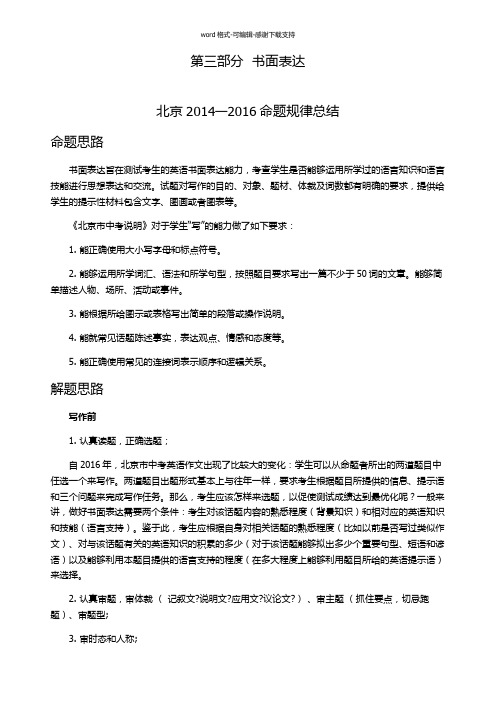
第三部分书面表达北京2014—2016命题规律总结命题思路书面表达旨在测试考生的英语书面表达能力,考查学生是否能够运用所学过的语言知识和语言技能进行思想表达和交流。
试题对写作的目的、对象、题材、体裁及词数都有明确的要求,提供给学生的提示性材料包含文字、图画或者图表等。
《北京市中考说明》对于学生“写”的能力做了如下要求:1. 能正确使用大小写字母和标点符号。
2. 能够运用所学词汇、语法和所学句型,按照题目要求写出一篇不少于50词的文章。
能够简单描述人物、场所、活动或事件。
3. 能根据所给图示或表格写出简单的段落或操作说明。
4. 能就常见话题陈述事实,表达观点、情感和态度等。
5. 能正确使用常见的连接词表示顺序和逻辑关系。
解题思路写作前1. 认真读题,正确选题;自2016年,北京市中考英语作文出现了比较大的变化:学生可以从命题者所出的两道题目中任选一个来写作。
两道题目出题形式基本上与往年一样,要求考生根据题目所提供的信息、提示语和三个问题来完成写作任务。
那么,考生应该怎样来选题,以促使测试成绩达到最优化呢?一般来讲,做好书面表达需要两个条件:考生对该话题内容的熟悉程度(背景知识)和相对应的英语知识和技能(语言支持)。
鉴于此,考生应根据自身对相关话题的熟悉程度(比如以前是否写过类似作文)、对与该话题有关的英语知识的积累的多少(对于该话题能够拟出多少个重要句型、短语和谚语)以及能够利用本题目提供的语言支持的程度(在多大程度上能够利用题目所给的英语提示语)来选择。
2. 认真审题,审体裁(记叙文?说明文?应用文?议论文?)、审主题(抓住要点,切忌跑题)、审题型;3. 审时态和人称;4. 根据中文提示,找出要点,判断功能,确定该功能所对应的时态、重要句型、短语或者谚语、格言等。
写作中1. 充分利用拟好的提纲,开始写作;2. 每个要点最好分解成两个分要点,以免太单薄;3. 尽量使用比较复杂的句子结构,比如并列句和复合句等;4. 尽量使用比较丰富的词汇和表达方式;5. 使用自己最有把握、最熟悉的词句;6. 充分利用提示语和自己拟出的句型、短语、谚语等来完整地回答三个问题,避免跑题。
2017年北京中考【英语】考试说明解读与备考策略
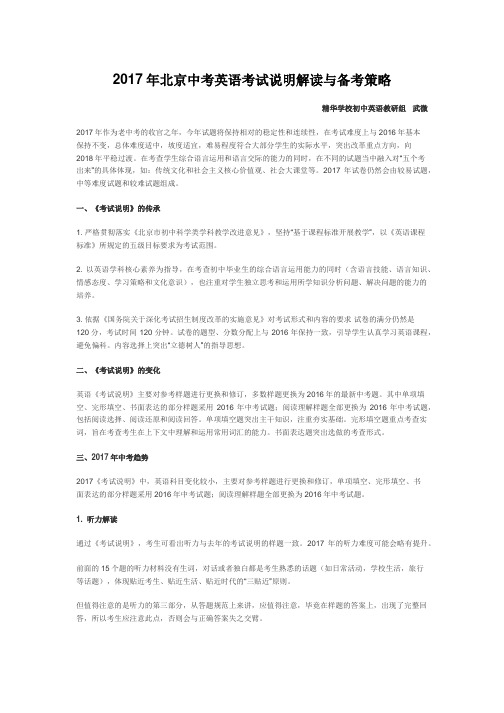
2017年北京中考英语考试说明解读与备考策略精华学校初中英语教研组武微2017年作为老中考的收官之年,今年试题将保持相对的稳定性和连续性,在考试难度上与2016年基本保持不变,总体难度适中,坡度适宜,难易程度符合大部分学生的实际水平,突出改革重点方向,向2018年平稳过渡。
在考查学生综合语言运用和语言交际的能力的同时,在不同的试题当中融入对“五个考出来”的具体体现,如:传统文化和社会主义核心价值观、社会大课堂等。
2017年试卷仍然会由较易试题,中等难度试题和较难试题组成。
一、《考试说明》的传承1. 严格贯彻落实《北京市初中科学类学科教学改进意见》,坚持“基于课程标准开展教学”,以《英语课程标准》所规定的五级目标要求为考试范围。
2. 以英语学科核心素养为指导,在考查初中毕业生的综合语言运用能力的同时(含语言技能、语言知识、情感态度、学习策略和文化意识),也注重对学生独立思考和运用所学知识分析问题、解决问题的能力的培养。
3. 依据《国务院关于深化考试招生制度改革的实施意见》对考试形式和内容的要求试卷的满分仍然是120分,考试时间120分钟。
试卷的题型、分数分配上与2016年保持一致,引导学生认真学习英语课程,避免偏科。
内容选择上突出“立德树人”的指导思想。
二、《考试说明》的变化英语《考试说明》主要对参考样题进行更换和修订,多数样题更换为2016年的最新中考题。
其中单项填空、完形填空、书面表达的部分样题采用2016年中考试题;阅读理解样题全部更换为2016年中考试题,包括阅读选择、阅读还原和阅读回答。
单项填空题突出主干知识,注重夯实基础。
完形填空题重点考查实词,旨在考查考生在上下文中理解和运用常用词汇的能力。
书面表达题突出选做的考查形式。
三、2017年中考趋势2017《考试说明》中,英语科目变化较小,主要对参考样题进行更换和修订,单项填空、完形填空、书面表达的部分样题采用2016年中考试题;阅读理解样题全部更换为2016年中考试题。
2017北京中考英语试题及答案解析

2017北京中考英语试题及答案解析2017北京中考英语试卷整体分析及备考建议2017年北京中考·····英语·整体·爱智康初中英语教学团队·岳鹏老师岳鹏老师:多年教学经验,多次获得好学乐知奖,两次一等奖,绝多数学生成绩优异,近4年中考中,每年都有满分学员,学员平均成绩超过117分,善于发觉孩子的知识和学习方法上的盲区,帮助孩子总结掌握语法点,完善知识体系构架,对中考趋势把握明确。
整体评价:2017年北京中考英语试题整体难度与去年基本持平,题型与去年保持一致:由听力理解,知识运用,阅读理解,书面表达四个部分构成。
严格按照2017年《北京市高级中等学校招生考试·考试说明》中英语科目题型设计和能力要求对学生进行综合的考查。
试题的整体难度适中,试题材料贴近中学生的日常生活,要求考生既要注重基础又要做到灵活运用,全面培养英语思维和英语语言使用的能力。
易错题型:完形:文章依然是夹叙夹议,考查的话题是个人情感,整个故事围绕主人公为了通过公民课程去做志愿者,并且通过聆听老人的故事及得到老人珍藏的项链,由此产生陪伴老人的态度的转变。
整体难度不大,文章主要考查学生根据文章的具体进行简单推断,以及上下文推断生词的词义,并能理解归纳文章的主旨要义的能力,建议平时可以根据往年进行适度的练习。
阅读理解:基本往年考查的体裁一致。
A篇应用文(信息图标类),B篇记叙文,C篇议论文,D篇说明文。
AB篇,比较容易。
CD 篇贴合社会情况,谈到同伴压力,以及消费占据生活主体的社会现象,题型丰富,考查学生的阅读以及理解能力。
写作:在考试形式上没有什么特殊的变化,还是二选一,学生选择其中一题完成任务的考试形式。
都是围绕着一个主题,根据题目提供的信息,提示词和三个问句进行内容的写作。
话题贴近学生的实际生活,让学生都有话可说。
第一个题目更强调对语言的实际应用能力;第二个话题相对较难,考查学生的思想深度和语言能力,突出社会主义核心价值观。
北京2017中考英语专项考点第三部分书面表达

第三部分书面表达北京2014—2016命题规律总结命题思路书面表达旨在测试考生的英语书面表达能力,考查学生是否能够运用所学过的语言知识和语言技能进行思想表达和交流。
试题对写作的目的、对象、题材、体裁及词数都有明确的要求,提供给学生的提示性材料包含文字、图画或者图表等。
《北京市中考说明》对于学生“写”的能力做了如下要求:1. 能正确使用大小写字母和标点符号。
2. 能够运用所学词汇、语法和所学句型,按照题目要求写出一篇不少于50词的文章。
能够简单描述人物、场所、活动或事件。
3. 能根据所给图示或表格写出简单的段落或操作说明。
4. 能就常见话题陈述事实,表达观点、情感和态度等。
5. 能正确使用常见的连接词表示顺序和逻辑关系。
解题思路写作前1. 认真读题,正确选题;自2016年,北京市中考英语作文出现了比较大的变化:学生可以从命题者所出的两道题目中任选一个来写作。
两道题目出题形式基本上与往年一样,要求考生根据题目所提供的信息、提示语和三个问题来完成写作任务。
那么,考生应该怎样来选题,以促使测试成绩达到最优化呢?一般来讲,做好书面表达需要两个条件:考生对该话题内容的熟悉程度(背景知识)和相对应的英语知识和技能(语言支持)。
鉴于此,考生应根据自身对相关话题的熟悉程度(比如以前是否写过类似作文)、对与该话题有关的英语知识的积累的多少(对于该话题能够拟出多少个重要句型、短语和谚语)以及能够利用本题目提供的语言支持的程度(在多大程度上能够利用题目所给的英语提示语)来选择。
2. 认真审题,审体裁(记叙文?说明文?应用文?议论文?)、审主题(抓住要点,切忌跑题)、审题型;3. 审时态和人称;4. 根据中文提示,找出要点,判断功能,确定该功能所对应的时态、重要句型、短语或者谚语、格言等。
写作中1. 充分利用拟好的提纲,开始写作;2. 每个要点最好分解成两个分要点,以免太单薄;3. 尽量使用比较复杂的句子结构,比如并列句和复合句等;4. 尽量使用比较丰富的词汇和表达方式;5. 使用自己最有把握、最熟悉的词句;6. 充分利用提示语和自己拟出的句型、短语、谚语等来完整地回答三个问题,避免跑题。
北京中考英语复习三年命题规律总结+中考精炼

书面表达旨在测试考生的英语书面表达能力,考查学生是否能够运用所学过的语言知识和语言技能进行思想表达和交流。
试题对写作的目的、对象、题材、体裁及词数都有明确的要求,提供给学生的提示性材料包含文字、图画或者图表等。
《北京市中考说明》对于学生“写”的能力做了如下要求:1. 能正确使用大小写字母和标点符号。
2. 能够运用所学词汇、语法和所学句型,按照题目要求写出一篇不少于50词的文章。
能够简单描述人物、场所、活动或事件。
3. 能根据所给图示或表格写出简单的段落或操作说明。
4. 能就常见话题陈述事实,表达观点、情感和态度等。
5. 能正确使用常见的连接词表示顺序和逻辑关系。
写作前1. 认真读题,正确选题;自2019年,北京市中考英语作文出现了比较大的变化:学生可以从命题者所出的两道题目中任选一个来写作。
两道题目出题形式基本上与往年一样,要求考生根据题目所提供的信息、提示语和三个问题来完成写作任务。
那么,考生应该怎样来选题,以促使测试成绩达到最优化呢?一般来讲,做好书面表达需要两个条件:考生对该话题内容的熟悉程度(背景知识)和相对应的英语知识和技能(语言支持)。
鉴于此,考生应根据自身对相关话题的熟悉程度(比如以前是否写过类似作文)、对与该话题有关的英语知识的积累的多少(对于该话题能够拟出多少个重要句型、短语和谚语)以及能够利用本题目提供的语言支持的程度(在多大程度上能够利用题目所给的英语提示语)来选择。
2. 认真审题,审体裁(记叙文?说明文?应用文?议论文?)、审主题(抓住要点,切忌跑题)、审题型;3. 审时态和人称;4. 根据中文提示,找出要点,判断功能,确定该功能所对应的时态、重要句型、短语或者谚语、格言等。
写作中1. 充分利用拟好的提纲,开始写作;2. 每个要点最好分解成两个分要点,以免太单薄;3. 尽量使用比较复杂的句子结构,比如并列句和复合句等;4. 尽量使用比较丰富的词汇和表达方式;5. 使用自己最有把握、最熟悉的词句;6. 充分利用提示语和自己拟出的句型、短语、谚语等来完整地回答三个问题,避免跑题。
北京中考英语复习三年命题规律总结+中考精炼:第二部分-语言技能专练
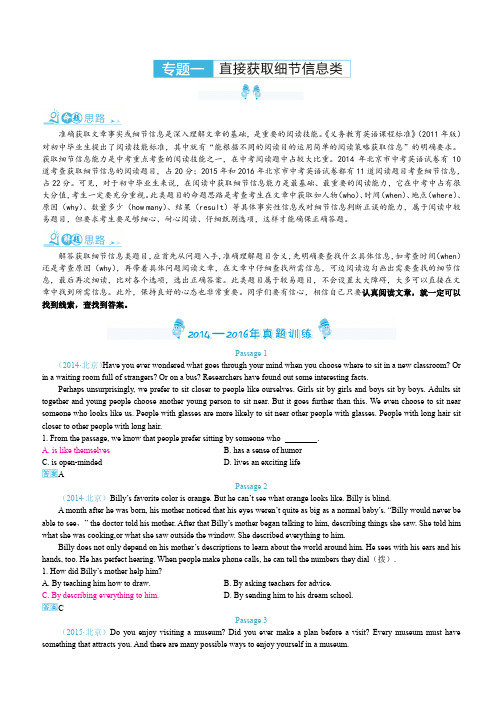
准确获取文章事实或细节信息是深入理解文章的基础,是重要的阅读技能。
《义务教育英语课程标准》(2011年版)对初中毕业生提出了阅读技能标准,其中就有“能根据不同的阅读目的运用简单的阅读策略获取信息”的明确要求。
获取细节信息能力是中考重点考查的阅读技能之一,在中考阅读题中占较大比重。
2014年北京市中考英语试卷有10道考查获取细节信息的阅读题目,占20分;2015年和2016年北京市中考英语试卷都有11道阅读题目考查细节信息,占22分。
可见,对于初中毕业生来说,在阅读中获取细节信息能力是最基础、最重要的阅读能力,它在中考中占有很大分值,考生一定要充分重视。
此类题目的命题思路是考查考生在文章中获取如人物(who)、时间(when)、地点(where)、原因(why)、数量多少(how many)、结果(result)等具体事实性信息或对细节信息判断正误的能力,属于阅读中较易题目,但要求考生要足够细心、耐心阅读、仔细甄别选项,这样才能确保正确答题。
解答获取细节信息类题目,应首先从问题入手,准确理解题目含义,先明确要查找什么具体信息,如考查时间(when)还是考查原因(why),再带着具体问题阅读文章,在文章中仔细查找所需信息,可边阅读边勾画出需要查找的细节信息,最后再次细读,比对各个选项,选出正确答案。
此类题目属于较易题目,不会设置太大障碍,大多可以直接在文章中找到所需信息。
此外,保持良好的心态也非常重要。
同学们要有信心,相信自己只要认真阅读文章,就一定可以找到线索,查找到答案。
Passage 1(2014·北京)Have you ever wondered what goes through your mind when you choose where to sit in a new classroom? Or in a waiting room full of strangers? Or on a bus? Researchers have found out some interesting facts.Perhaps unsurprisingly, we prefer to sit closer to people like ourselves. Girls sit by girls and boys sit by boys. Adults sit together and young people choose another young person to sit near. But it goes further than this. We even choose to sit near someone who looks like us. People with glasses are more likely to sit near other people with glasses. People with long hair sit closer to other people with long hair.1. From the passage, we know that people prefer sitting by someone who .A. is like themselvesB. has a sense of humorC. is open-mindedD. lives an exciting lifeAPassage 2(2014·北京)Billy’s favorite color is orange. But he can’t see what orange looks like. Billy is blind.A month after he was born, his mother noticed that his eyes weren’t quite as big as a normal baby’s. “Billy would never be able to see,” the doctor told his mother. After that Billy’s mother beg an talking to him, describing things she saw. She told him what she was cooking,or what she saw outside the window. She described everything to him.Billy does not only depend on his mother’s descriptions to learn about the world around him. He sees wit h his ears and his hands, too. He has perfect hearing. When people make phone calls, he can tell the numbers they dial(拨).1. How did Billy’s mother help him?A. By teaching him how to draw.B. By asking teachers for advice.C. By describing everything to him.D. By sending him to his dream school.CPassage 3(2015·北京)Do you enjoy visiting a museum? Did you ever make a plan before a visit? Every museum must have something that attracts you. And there are many possible ways to enjoy yourself in a museum.If you follow these steps below, you’ll know what is worth seeing and doing, so that you can make the most of your time at the museum.Decide what museum you will visit. There are so many different kinds of museums and you first need to find one that you like. It’s easy for you to choose one and start an enjoyable visit!Do some research online. Every museum now has a website which allows you to look through the information about it. On the website, you may look for such things as:...1. According to the passage, we should first .A. do some research onlineB. make a plan for lunchC. decide on a museum to visitD. choose a friend to go withCPassage 4(2016·北京)Brian was a funny student. He loved watching comedies(喜剧)best and hoped to become a comedy actor one day.When he heard about the talent show to be held at this school, Brian decided to take part in. He had never acted on stage (舞台)before, and he was very excited. But some students laughed at him. “You are not funny but sill y,” Ken, one of his classmates, said to his face. “No one will like what you do,” another boy also said to him, loudly.Brian couldn’t understand why they were so unkind to him. For a moment, he thought about giving up the show. But he remembered how much his friends liked his jokes, and also his teachers said he was very funny. So he decided to prepare for the show.Brian did a great job at the talent show. Everyone loved his performance, and he won the first prize! His teachers and friends were prou d of him. Even so, Ken told Brian that he was not funny, and that he would never be successful. Brian didn’t understand why Ken said so, but he realized that it had nothing to do with him. He confidently continued to work towards his goal.1. Brian decided to prepare for the show because .A. his friends liked his jokesB. he was invited by a TV stationC. he wasn’t busy acting in moviesD. Ken was expecting his performanceAPassage 5(2016·北京)Which hand do you use when you write?About 8 to 15 percent of people are left handed. They often have to use tools that are designed for right-handed people. So it is difficult for left-handers to use most tools. If you are right handed, try this experiment: Take a knife with your left hand and try cutting a potato into pieces. Don’t be surprised if you feel awkward (别扭的).In the past, people thought it was strange to use the left hand. Young students looked down upon their left-handed classmates. Some children were even punished for using their left hand to write. But these days parents and teachers have accepted that. In almost every school in the world, left-handed students can use their left hand to write.1. If right-handers cut up potatoes with their left hand, they will .A. get hurtB. give up cuttingC. feel awkwardD. change their toolsCPassage 1(2014·东城一模)Christian Bucks may be young, but he surely knows how to be a good friend. When the York, Pennsylvania, second-grader noticed that some of his schoolmates didn’t have anyone to pla y with during break time, he came up with a way to help them. He suggested having something called a “buddy bench” put in on his school’s playground.A buddy bench is a special bench where students can sit if they are feeling bored or lonely. It’s usual ly brightly colored with “BUDDY BENCH” in big letters. Other students can then go to the bench and ask them if they would like to play or talk.“We show we care about others when we ask others to play,” Christian told reporters.1. Christian Bucks suggested having a buddy bench to help .A. his teachersB. his studentsC. his parentsD. his schoolmatesDPassage 2(2015·海淀一模)Need to buy something? Why go to a store? Buy it on the Internet! Need it now? Why wait? Ask for next-day delivery! Each day, more and more people try online shopping. In fact, online sales have doubled in the last ten years. But not everyone is excited. Some scientists now say that online shopping is bad for the environment.People are surprised to hear this. “They think,‘I don’t need to drive, and the business doesn’t need to build a store, so there will be less pollution,’” says Nuria Prost, an environmental scientist. “But it is not so simple. In fact, online shopping is wasteful. It also adds to air pollution. ”In truth, the Internet is not always as good a friend to the environment as it seems. For example, most people thought that the Internet would help offices use less paper and other materials. But paper use increased by 33 percent between 1986 and 1997. “Onlin e shopping could have similarly negative effects,” says Nevil Cohen, a professor of environmental science.Part of the problem is what people are buying these days. In the past, people bought things on the Internet that did not require much packing material, such as books and clothing. But now people also shop online for large, heavy products such as televisions, computers, and furniture. These products need to be packed in large amounts of plastic and paper. This creates a lot of waste.1. Why does online shopping create a lot of waste?A. Because companies charge more for product returns.B. Because people buy too many things they don’t need.C. Because paper use has increased by 33 percent from 1986 to 1997.D. Because large, heavy products require much packing material.DPassage 3(2016·海淀一模)Living next to next is the principle(原则)of a neighbor. Good neighborliness is the ideal to be aimed at. As the saying goes, no man is an island; he has to live with his neighbors. To make life easy and pleasant, he must cooperate with his neighbors.Whether one likes it or not, one cannot do without neighbors. Normally he may think one can do without neighbors because he can manage all comforts and services, so the services or the need for a friend may not happen. However, the sympathy(同情), admiration and appreciation which a neighbor may offer will have a great humanizing influence. To share one’s view and sometimes even sadness, one needs some neighbors.But all neighbors are not always keeping the friendly relationship. Stresses and tension(紧张)develop because of misunderstanding. Very often children may be the cause for tense feelings. The neighbor’s son may pick a flower or a fruit fr om your garden and an argument may follow. Again he may throw his ball at your window, breaking it. These are common cases so far as the younger one is concerned but it is for the elders to view them with calmness and make up for it. This may read easily on paper but not so in real life. But being broad-minded, one must be able to tolerate(容忍). Another reason for tension may be the animals. Your neighbor’s dog may be a real trouble or his chickens would come into your garden and eat away your plants.1. Which of the following may cause misunderstanding?A. Hobbies and habits.B. Children and pets.C. Sports and games.D. Likes and dislikes.BPassage 4(2014·朝阳一模)You’re buying a used car, moving into a new house, or deciding which doctor should treat your illness. These are times when you need to get directly to the core (核心)of an important matter.Asking general questions gets little valuable information and may even result in unreal answers, says Julia Minson, a visiting scholar in decision science at the University of Pennsylvania in the US. The best way, says Minson, is to ask a lot of questions that discover there are problems.Let’s say someone is selling a used iPod. An example of a general question is “What can you tell me about it?” A positive-assumption (正面推测)question is “There aren’t any problems with it, right?” But a negative-assumption question, such as “What problems have you had with it?” will get the most honest answer, found Minson and her team.In a study,87% of the sellers warned the buyers of problems when asked a negative- assumption question, while 59% of those did the same thing to a positive-assumption one.When you want the truth, you have to ask for it. What problems does this car have? What are the worst parts of this job? How many people with my kind of illness have been successfully treated? Your questions should communicate that you are sure there will be difficulties and that you want to know about them.1. What can we do if we want the truth, according to the passage?A. Ask for it ourselves.B. Talk with honest people.C. Study it ourselves.D. Do some experiments.APassage 5(2016·通州二模)Teenage life is interesting, adventurous(冒险的)and difficult. Teenagers have to go through many problems. It may probably be a family problem or a school problem. It is important to learn how to deal with those problems.Be grateful(感激的)of your parents’ support. When you have a problem, ask your parents to support you. When a child is thirteen, he feels like he has grown up. As a part of a family, teenagers do not want their parents to involve in their personal activities and they think they are able to be independent(独立的).It is very normal and parents should also cooperate(合作)with their kids. They should try to get to know what their child needs. Sometimes a child may be hesitating(犹豫)to tell something but they should try to know what the matter is. Parents’ support is the greatest support for a teenager.Learn to live in society.Society plays a very important role in everyone’s life. What teenagers see from society has a big influence on their characters.As a teenager, you should know what is wrong and what is right. Never be impatient in making a decision. Always keep cool and calm(沉着的), take advice from your parents and you will make a good decision. Don’t let the ba d things of society influence you. Instead, get to learn good things from society.Learn from school. School is like a second home. We learn a lot from our school, and at the same time, it is the hardest part of a teenager’s life.·First are the stud ies. You should know what you want to do. Don’t come under pressure in making choices.·Learn to take your own stand(立场). If you don’t do well in exams, don’t feel broken. Be strong-minded and spend more time on your studies.·Share your problems with your friends. Your friends are always ready to help. If you are confused in your life, talk about what you’ve done and what you want to do with your friends.1. When teenagers make a decision, they should .A. know their parents’ needsB. be impatientC. do it by themselvesD. keep calmDPassage 1There! I have drawn the chairs into the right corners and dusted the room nicely. How cold papa and mamma will be when they return from their long ride! It is not time to toast the bread yet, and I am tired of reading.What shall I do? Somehow I can’t help thinking about the pale face of that beggar girl all the time. I can see the glad light filling her eyes, just as plain as I did when I laid the dime in her little dirty hand.How much I had thought of that dime, too!Grandpa gave it to me, Mary Williams, a whole month ago, and I had kept it ever since in my red box upstairs, but those sugar apples looked so beautiful, and were so cheap—only a dime a piece—that I made up my mind to have one.1. Who gave the dime to the beggar girl?A. Mary’s mamma.B. Mary’s papa.C. Mary’s grandpa.D. Mary.DPassage 2Now everyone can read it and see it! The Internet is taking over the way we view the world—from news, to communication, to shopping... Will the Internet make our global society more equal, giving everyone an equal chance to findout what need to know and in turn get their message out there?The Internet has taken away a great deal of business away from traditional forms of media, especially newspapers. Instead of buying a newspaper and reading yesterday’s news, people can go online and find out what happened in the last few hours, and for free too! This has resulted in many newspapers going bankrupt and most newspapers, especially local papers, have been bought by big syndicates. Many journalists are concerned that the quality of the news published has come down as many newspapers cut costs. Also, they are concerned that too many newspapers are now owned by the same companies and so there are not really that many different views and ideas being expressed.1. Newspapers have declined in their influence now, because.A. there is always some untrue news in the newspapersB. the newspapers can’t provide the latest newsC. people can get free information from the InternetD. most people don’t care about news at allCPassage 3One winter Sunday, my little sister, Colleen, and I built the greatest snowman ever. We gave him a traditional carrot nose, a cool hat, a comfortable scarf and gloves on the end of his stick arms. He was a masterpiece.The next morning when looking outside, we smiled lovingly at him over our meal. We gave him a high-five as we passed by on our way to school. A lot of kids went past our house, so he was the hot topic at our school that morning. My sister and I generously shared our professional snowman-building suggestions and techniques with our classmates.The day dragged on until finally we could rush home. But as our yard came into sight, we saw somethi ng wasn’t right. The snowman was gone! We only found a broken stick here, a torn glove there and balls of snow everywhere. Worst of all, the snowman’s carrot nose lay limp and half-eaten. What had happened?1. Which of the following statements is TRUE according to the three paragraphs?A. Many kids went to the writer’s house to see the snowman.B. My brother and I made a lovely snowman one winter Sunday.C. The classmates asked them for advice on making a great snowman.D. It was a pleasure for the writer to share their skills about snowman-building.DPassage 4You may have heard the music and dancing from the other side of the world when Carnival happened in Rio, Brazil. On Feb 5, the festival officially began, lasting until Feb 10. So why does this colorful event’s energy (活力)continue to excite people from all over the world?Carnival is a crazy six-day celebration that happens around 40 days before the Christian (基督徒的)Easter festival. It happens at the hottest time in summer in Rio and marks the time before the start of Lent, a time when Christians are supposed to give up doing things they like. Those who take part in Carnival are allowed to have fun by enjoying themselves as much as possible. They dance, wear colorful costumes and have a great time.Carnival time has a soundtrack (配乐)of samba music, a type of music that is completely Brazilian. During Carnival, the 14 best samba schools in Rio are each given the chance to show off their music and dancing, joined by 200 to 400 drummers (鼓手).And it’s not just the locals who entertain the crowds. According to Lonely Planet, some of the schools are “open to travelers who may be passing through town and are prepared to practice for weeks, learn a song, buy a brightly-colored costume and wear it i n front of tens of thousands of people”.In the end, judges decide who brought the best dance moves, looks, words and heart to Carnival. And the winner is the pride of Brazil.1. What do you know about Rio Carnival from the article?A. Both locals and travelers enjoy the Carnival excitedly.B. It happens at the coldest time in winter in Rio.C. People sing and dance with samba music in common clothes.D. Nobody cares about the winner of the Carnival.APassage 5Why do people want to go to university? For some, it is the desire to learn. At university, you will be taught by lecturers and professors who may be leading figures in their fields of study or at the forefront of their field of research. The opportunity to learn from and to discuss and interact with these leading academics is what drives some people to apply to university. For others, going to university provides the all-important stepping-stone for their careers, especially amongst certain professions like medicine and engineering, where obtaining a university degree in the relevant field is the minimum requirement. However, for the majority of Western people, university means freedom from home.In most British and American universities, students live in halls or dormitories, especially in their first year. Whether you are living on your own in an ensuite room or in a shared flat with five other strangers, your bedroom is now your personal space and many people like to decorate it in such a way that will reflect their tastes and values. Many students have to learn to share facilities like bathrooms and kitchens whilst others may have their own fridge or microwave. Either way, this is the time when you learn to develop your own personal living space whilst pulling your weight and sharing the responsibility for keeping shared areas clean. You may not get on well with everyone you meet. People often have different habits and circumstances which may affect the way they live. However, university is a time when you learn to look after yourself, to develop your values and to accept those who may be different.1. Which is NOT the reason for people to go to university?A. To study all kinds of knowledge from professors.B. To learn some skills to get ready for future work.C. To get away from home and never return.D. To learn to take care of themselves and live independently.C《义务教育英语课程标准》(2011年版)对初中毕业生明确提出了“能根据上下文和构词法推断、理解生词的含义”的阅读技能标准要求。
2017北京中考英语复习三年命题规律总结中考专项突破篇阅读理解精炼试题 人教版1
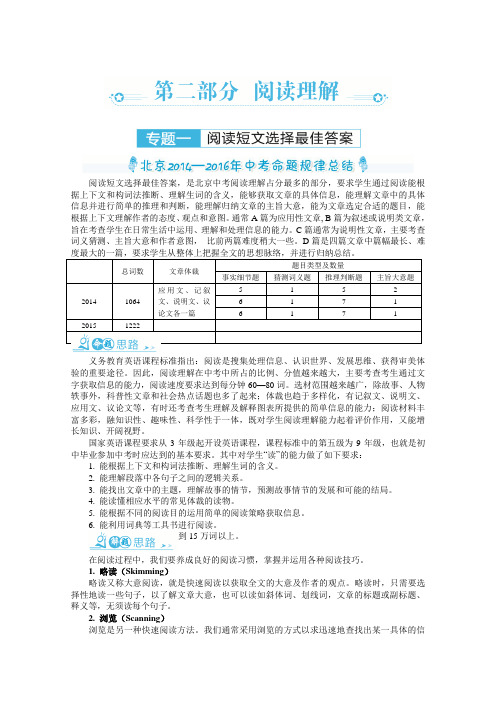
阅读短文选择最佳答案,是北京中考阅读理解占分最多的部分,要求学生通过阅读能根据上下文和构词法推断、理解生词的含义,能够获取文章的具体信息,能理解文章中的具体信息并进行简单的推理和判断,能理解归纳文章的主旨大意,能为文章选定合适的题目,能根据上下文理解作者的态度、观点和意图。
通常A 篇为应用性文章, B 篇为叙述或说明类文章,旨在考查学生在日常生活中运用、理解和处理信息的能力。
C 篇通常为说明性文章,主要考查词义猜测、主旨大意和作者意图, 比前两篇难度稍大一些。
D 篇是四篇文章中篇幅最长、难 总词数 文章体裁题目类型及数量 事实细节题 猜测词义题 推理判断题 主旨大意题 20141064 应用文、记叙文、说明文、议论文各一篇 5 1 5 2 6 1 7 1 6 1 7 120151222 2016 1318 义务教育英语课程标准指出:阅读是搜集处理信息、认识世界、发展思维、获得审美体验的重要途径。
因此,阅读理解在中考中所占的比例、分值越来越大,主要考查考生通过文字获取信息的能力,阅读速度要求达到每分钟60—80词。
选材范围越来越广,除故事、人物轶事外,科普性文章和社会热点话题也多了起来;体裁也趋于多样化,有记叙文、说明文、应用文、议论文等,有时还考查考生理解及解释图表所提供的简单信息的能力;阅读材料丰富多彩,融知识性、趣味性、科学性于一体,既对学生阅读理解能力起着评价作用,又能增长知识、开阔视野。
国家英语课程要求从3年级起开设英语课程,课程标准中的第五级为9年级,也就是初中毕业参加中考时应达到的基本要求。
其中对学生“读”的能力做了如下要求:1. 能根据上下文和构词法推断、理解生词的含义。
2. 能理解段落中各句子之间的逻辑关系。
3. 能找出文章中的主题,理解故事的情节,预测故事情节的发展和可能的结局。
4. 能读懂相应水平的常见体裁的读物。
5. 能根据不同的阅读目的运用简单的阅读策略获取信息。
6. 能利用词典等工具书进行阅读。
北京中考英语各题型答题技巧

北京中考英语各题型答题技巧第一篇:北京中考英语各题型答题技巧初中英语各种题型的解题技巧英语听力题解题技巧一、听力技巧之——听辨单词类的答题技巧此类题的出题形式多是听句子,从所给选项中选出所听句子里含有的那个单词。
此类题的答题技巧是这样的:1.先浏览一遍题干,注意比较它们在发音上的不同之处,这样在听的时候就可以有意识地注意这个不同之处,从而迅速作答。
2.由于所给选项是四个读音相似、极易混淆的单词,而录音中播放的是一个句子,所以我们要尽量从整体上理解句子,不要只顾逐个听单词,要在语境中确定选项。
3.平时要注意那些容易混淆的音素和那些读音十分相近的单词。
如thirteen/thirty;close/clothes;present/parent;horse/house;knows/news;bread/break/breath等。
4.注意区别句子中的同音词。
如whether/weather;four/for;two/too/to;where/wear等。
二、听力技巧之——听句子选择恰当答语类的答题技巧听句子选择恰当答语是常考题型之一,该题型主要考查学生的情景反应能力,要做这类题我们要做好以下三点:1.听前认真浏览选项,掌握其意思。
2.听时要注意听清句子的意思。
同时注意对话出现的场景,从语调、疑问词中判断句的类型以此确定回答的内容,回答内容要与问句人称、时态等保持一致。
3.平时我们还应熟练掌握日常交际用语。
听时要正确判断出句子的语言交际功能,正确理解说话人意图的基础上作出正确选择。
三、听力技巧之——图文搭配类听力的解题技巧这类题主要是要求学生能把正确的图画语言与所听到的内容联系起来。
它具有生动简明的特点。
做好这类试题的关键是“听音”、“明意”。
一是要能听懂句意,而听懂句意的前提是能抓住句中的“关键词”,二是要具备“读图、识图”的能力。
清楚图画中的人物、动作、形态等。
四、听力技巧之——对话理解的答题技巧由于对话是一个相互联系的整体,听前我们要浏览选项,了解一定的信息,并预测话题及内容。
中考英语专题复习一 名词(含三年命题规律总结+精炼)(2021学年)

中考零距离北京市2017年中考英语专题复习一名词(含三年命题规律总结+精炼)编辑整理:尊敬的读者朋友们:这里是精品文档编辑中心,本文档内容是由我和我的同事精心编辑整理后发布的,发布之前我们对文中内容进行仔细校对,但是难免会有疏漏的地方,但是任然希望(中考零距离北京市2017年中考英语专题复习一名词(含三年命题规律总结+精炼))的内容能够给您的工作和学习带来便利。
同时也真诚的希望收到您的建议和反馈,这将是我们进步的源泉,前进的动力。
本文可编辑可修改,如果觉得对您有帮助请收藏以便随时查阅,最后祝您生活愉快业绩进步,以下为中考零距离北京市2017年中考英语专题复习一名词(含三年命题规律总结+精炼)的全部内容。
名词名词是我们在英语学习中最先接触到的一类词。
任何一个题,一篇文章都离不开名词,在中考试题中直接考查名词书写的部分有很多:在听力部分要求写出月份、星期、地点、国家等名词的题占1分,在10分的完形填空题中考查意义相近的名词的辨析的占3分,阅读与表达部分涉及的名词占4~5分,写作部分更是考查考生对名词掌握的广度与深度。
在北京市历届中考语法试题中直接考查名词的部分就占到11分之多,其次,对名词的准确掌握更是理解文章的关键。
由此可见,名词的掌握有多么重要!2014年—2016年北京市中考有关名词的测试考点分析:2014年2015年2016年17.tableﻩ18。
Cit y19。
Parkﻩ20。
bathroom35. A。
vegetableC.breadﻩD。
fish42. A。
loveB。
successC.friendshipﻩD。
honor 16. Nick 17. River18。
eggs ﻩ19。
milk31。
A。
baseballC. chessﻩD.toys36. A。
attention ﻩB.messageC.praiseﻩD。
trust39. A. choiceﻩB。
homeworkC。
speech D。
2017北京中考英语复习三年命题规律总结中考连词精炼试题 人教版
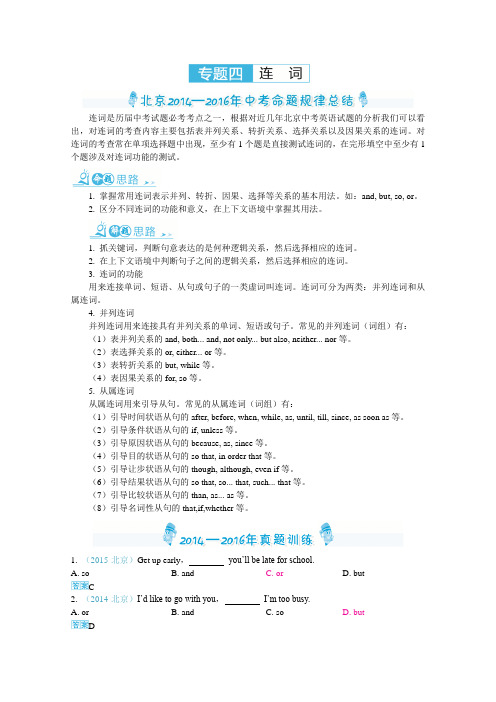
连词是历届中考试题必考考点之一,根据对近几年北京中考英语试题的分析我们可以看出,对连词的考查内容主要包括表并列关系、转折关系、选择关系以及因果关系的连词。
对连词的考查常在单项选择题中出现,至少有1个题是直接测试连词的,在完形填空中至少有1个题涉及对连词功能的测试。
1. 掌握常用连词表示并列、转折、因果、选择等关系的基本用法。
如:and, but, so, or。
2. 区分不同连词的功能和意义,在上下文语境中掌握其用法。
1. 抓关键词,判断句意表达的是何种逻辑关系,然后选择相应的连词。
2. 在上下文语境中判断句子之间的逻辑关系,然后选择相应的连词。
3. 连词的功能用来连接单词、短语、从句或句子的一类虚词叫连词。
连词可分为两类:并列连词和从属连词。
4. 并列连词并列连词用来连接具有并列关系的单词、短语或句子。
常见的并列连词(词组)有:(1)表并列关系的and, both... and, not only... but also, neither... nor等。
(2)表选择关系的or, either... or等。
(3)表转折关系的but, while等。
(4)表因果关系的for, so等。
5. 从属连词从属连词用来引导从句。
常见的从属连词(词组)有:(1)引导时间状语从句的after, before, when, while, as, until, till, since, as soon as等。
(2)引导条件状语从句的if, unless等。
(3)引导原因状语从句的because, as, since等。
(4)引导目的状语从句的so that, in order that等。
(5)引导让步状语从句的though, although, even if等。
(6)引导结果状语从句的so that, so... that, such... that等。
(7)引导比较状语从句的than, as... as等。
2017北京中考英语复习三年命题规律总结+中考精炼:专题七 宾语从句和状语从句
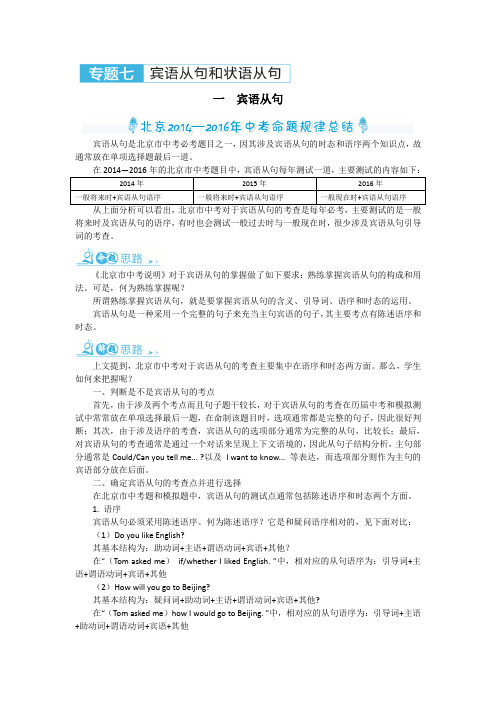
一宾语从句宾语从句是北京市中考必考题目之一,因其涉及宾语从句的时态和语序两个知识点,故通常放在单项选择题最后一道。
在2014—2016年的北京市中考题目中,宾语从句每年测试一道,主要测试的内容如下:从上面分析可以看出,北京市中考对于宾语从句的考查是每年必考,主要测试的是一般将来时及宾语从句的语序,有时也会测试一般过去时与一般现在时,很少涉及宾语从句引导词的考查。
《北京市中考说明》对于宾语从句的掌握做了如下要求:熟练掌握宾语从句的构成和用法。
可是,何为熟练掌握呢?所谓熟练掌握宾语从句,就是要掌握宾语从句的含义、引导词、语序和时态的运用。
宾语从句是一种采用一个完整的句子来充当主句宾语的句子,其主要考点有陈述语序和时态。
上文提到,北京市中考对于宾语从句的考查主要集中在语序和时态两方面。
那么,学生如何来把握呢?一、判断是不是宾语从句的考点首先,由于涉及两个考点而且句子题干较长,对于宾语从句的考查在历届中考和模拟测试中常常放在单项选择最后一题,在命制该题目时,选项通常都是完整的句子,因此很好判断;其次,由于涉及语序的考查,宾语从句的选项部分通常为完整的从句,比较长;最后,对宾语从句的考查通常是通过一个对话来呈现上下文语境的,因此从句子结构分析,主句部分通常是Could/Can you tell me... ?以及I want to know... 等表达,而选项部分则作为主句的宾语部分放在后面。
二、确定宾语从句的考查点并进行选择在北京市中考题和模拟题中,宾语从句的测试点通常包括陈述语序和时态两个方面。
1. 语序宾语从句必须采用陈述语序。
何为陈述语序?它是和疑问语序相对的,见下面对比:(1)Do you like English?其基本结构为:助动词+主语+谓语动词+宾语+其他?在“(Tom asked me)if/whether I liked English. ”中,相对应的从句语序为:引导词+主语+谓语动词+宾语+其他(2)How will you go to Beijing?其基本结构为:疑问词+助动词+主语+谓语动词+宾语+其他?在“(Tom asked me)h ow I would go to Beijing. ”中,相对应的从句语序为:引导词+主语+助动词+谓语动词+宾语+其他可以看出,疑问语序中,助动词要放在主语之前,而在陈述语序中,有时没有助动词,如果有的话要放在主语之后。
北京中考英语各题型答题技巧
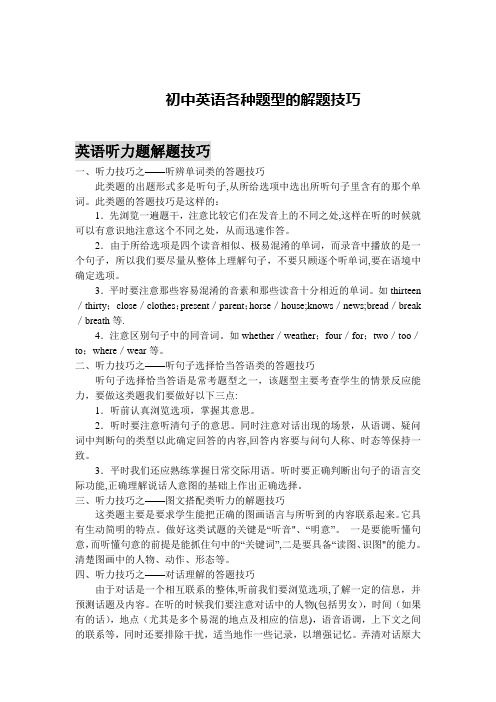
初中英语各种题型的解题技巧英语听力题解题技巧一、听力技巧之——听辨单词类的答题技巧此类题的出题形式多是听句子,从所给选项中选出所听句子里含有的那个单词。
此类题的答题技巧是这样的:1.先浏览一遍题干,注意比较它们在发音上的不同之处,这样在听的时候就可以有意识地注意这个不同之处,从而迅速作答。
2.由于所给选项是四个读音相似、极易混淆的单词,而录音中播放的是一个句子,所以我们要尽量从整体上理解句子,不要只顾逐个听单词,要在语境中确定选项。
3.平时要注意那些容易混淆的音素和那些读音十分相近的单词。
如thirteen /thirty;close/clothes;present/parent;horse/house;knows/news;bread/break /breath等.4.注意区别句子中的同音词。
如whether/weather;four/for;two/too/to;where/wear等。
二、听力技巧之——听句子选择恰当答语类的答题技巧听句子选择恰当答语是常考题型之一,该题型主要考查学生的情景反应能力,要做这类题我们要做好以下三点:1.听前认真浏览选项,掌握其意思。
2.听时要注意听清句子的意思。
同时注意对话出现的场景,从语调、疑问词中判断句的类型以此确定回答的内容,回答内容要与问句人称、时态等保持一致。
3.平时我们还应熟练掌握日常交际用语。
听时要正确判断出句子的语言交际功能,正确理解说话人意图的基础上作出正确选择。
三、听力技巧之——图文搭配类听力的解题技巧这类题主要是要求学生能把正确的图画语言与所听到的内容联系起来。
它具有生动简明的特点。
做好这类试题的关键是“听音"、“明意”。
一是要能听懂句意,而听懂句意的前提是能抓住句中的“关键词”,二是要具备“读图、识图"的能力。
清楚图画中的人物、动作、形态等。
四、听力技巧之——对话理解的答题技巧由于对话是一个相互联系的整体,听前我们要浏览选项,了解一定的信息,并预测话题及内容。
北京市2017年英语中考趋势及备考建议
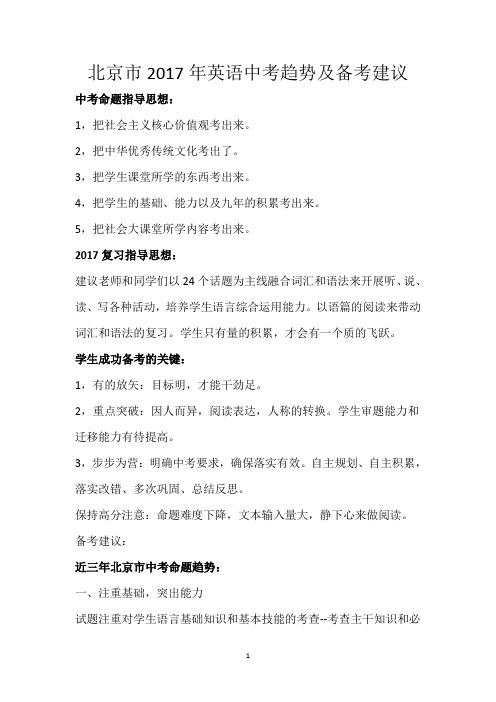
北京市2017年英语中考趋势及备考建议中考命题指导思想:1,把社会主义核心价值观考出来。
2,把中华优秀传统文化考出了。
3,把学生课堂所学的东西考出来。
4,把学生的基础、能力以及九年的积累考出来。
5,把社会大课堂所学内容考出来。
2017复习指导思想:建议老师和同学们以24个话题为主线融合词汇和语法来开展听、说、读、写各种活动,培养学生语言综合运用能力。
以语篇的阅读来带动词汇和语法的复习。
学生只有量的积累,才会有一个质的飞跃。
学生成功备考的关键:1,有的放矢:目标明,才能干劲足。
2,重点突破:因人而异,阅读表达,人称的转换。
学生审题能力和迁移能力有待提高。
3,步步为营:明确中考要求,确保落实有效。
自主规划、自主积累,落实改错、多次巩固、总结反思。
保持高分注意:命题难度下降,文本输入量大,静下心来做阅读。
备考建议:近三年北京市中考命题趋势:一、注重基础,突出能力试题注重对学生语言基础知识和基本技能的考查--考查主干知识和必备技能。
※听力理解和阅读理解:获取具体信息和简单推断占了大多数。
※单项填空:熟悉的基础语法点。
※完形填、空:动、名、形、副。
4321,442。
谈完形填空必色变!※书面表达:话题熟悉、开放性、有话说。
二、加大阅读考查力度※题材丰富(话题广泛,主题突出,图文并茂,兼顾学生的已有经验和未知领域,贴近学生、贴近生活、贴近时代)※体裁多样(应用文、记叙文、说明文和议论文)促进阅读素养的提升。
三、价值引领,寓教于考。
※体现工具性和人文性。
※体现社会主义核心观中与学生联系紧密的价值准则。
※注重对考生情感态度和价值观进行积极正向的引导。
※注重对学生跨文化意识的培养。
四、以人为本,稳中求变※开放性和交际性※自主选择、个性发挥※有利于引导学生在后续的英语学习中关注生活、联系自身、主动思考。
备考建议:什么样的复习方法才是最行之有效的?※“知彼”,就是要认真分析《考试说明》和中考试卷,起码做三套往年的中考卷子,重点要去做去年各区的试卷,从中把握中考的内容、分布、出题方式、难易程度,通过标准答案找到自己的错误,分析错误的原因,找到自己的不足,由此选用得当的复习方法。
2017北京中考英语复习三年命题规律总结中考专项突破篇完形填空精炼试题 人教版

完形填空是中考试题中考查学生阅读能力及掌握语言基础知识能力的综合性题目。
它通常是一篇语意完整的短文。
在选材上,内容新颖、有趣、时代感强且都贴近现实社会生活或学生校园生活。
完形填空题的第一句通常不设空,给读者提供一定的语言背景。
中考完形填空题主要考查学生以下三个方面的知识和技能:一、对文章的整体理解,上下文段落的衔接,逻辑思维与判断能力。
二、对词汇和惯用法等语言基础知识的考查,多以实词为主,虚词为辅。
根据对近几年中考完形填空题的分析,各种词类的考查比例由多到少,顺序如下:动词、名词、形容词、副词、连词和代词等,也注重考查习惯搭配和词语辨析。
三、对生活中常见的事实进行推理和判断的能力。
完形填空是中考试题中考查学生阅读能力及掌握语言基础知识能力的综合性题目。
完形填空题的命题思路主要有两大特点:1. 语境充分完形填空的话题通常是学生比较熟悉的日常生活和学习的场景;阅读语境充分,便于学生根据语意完整、语法正确、合乎逻辑的原则,通过逻辑思维,联系上下文,推断出正确的答案。
从下面2014年到2016年北京中考完形填空分析的表格就可以看出本特点。
近三年来中考完形填空都有育人功能。
尽管看起来形式上有残缺(若干个空),但它的内容,语言习惯,句与句之间的衔接点,句子与段落之间的联系,段落与段落之间的逻辑顺序仍或隐或现地存在于篇章之中。
更重要的是,完形填空可以使读者从精神层面得到升华,或从道德层面得以提高,或从内容层面得以拓展眼界。
例如:2014年北京中考完形填空,通过讲述作者在超市里碰到一个陌生人为流浪狗买牛奶和食物的故事,传达了“向他人传递爱与幸福的圣诞老人的角色并不需要等到圣诞节那天才能有,每天都可以有”的理念。
解答完形填空的总原则是“先完意,后完形”,即先理解文章的主旨大意和作者要传递的理念,再进行选择填空。
在做选择填空题时,我们可以从以下五方面思考:1. 充分利用首句信息答题完形填空的首句不设空,而是尽可能多地给考生提供一些必要的信息,因而读懂首句可以帮助考生建立正确的思维导向,避免走弯路。
- 1、下载文档前请自行甄别文档内容的完整性,平台不提供额外的编辑、内容补充、找答案等附加服务。
- 2、"仅部分预览"的文档,不可在线预览部分如存在完整性等问题,可反馈申请退款(可完整预览的文档不适用该条件!)。
- 3、如文档侵犯您的权益,请联系客服反馈,我们会尽快为您处理(人工客服工作时间:9:00-18:30)。
准确获取文章事实或细节信息是深入理解文章的基础,是重要的阅读技能。
《义务教育英语课程标准》(2011年版)对初中毕业生提出了阅读技能标准,其中就有“能根据不同的阅读目的运用简单的阅读策略获取信息”的明确要求。
获取细节信息能力是中考重点考查的阅读技能之一,在中考阅读题中占较大比重。
2014年北京市中考英语试卷有10道考查获取细节信息的阅读题目,占20分;2015年和2016年北京市中考英语试卷都有11道阅读题目考查细节信息,占22分。
可见,对于初中毕业生来说,在阅读中获取细节信息能力是最基础、最重要的阅读能力,它在中考中占有很大分值,考生一定要充分重视。
此类题目的命题思路是考查考生在文章中获取如人物(who)、时间(when)、地点(where)、原因(why)、数量多少(how many)、结果(result)等具体事实性信息或对细节信息判断正误的能力,属于阅读中较易题目,但要求考生要足够细心、耐心阅读、仔细甄别选项,这样才能确保正确答题。
解答获取细节信息类题目,应首先从问题入手,准确理解题目含义,先明确要查找什么具体信息,如考查时间(when)还是考查原因(why),再带着具体问题阅读文章,在文章中仔细查找所需信息,可边阅读边勾画出需要查找的细节信息,最后再次细读,比对各个选项,选出正确答案。
此类题目属于较易题目,不会设置太大障碍,大多可以直接在文章中找到所需信息。
此外,保持良好的心态也非常重要。
同学们要有信心,相信自己只要认真阅读文章,就一定可以找到线索,查找到答案。
Passage 1(2014·北京)Have you ever wondered what goes through your mind when you choose where to sit in a new classroom? Or in a waiting room full of strangers? Or on a bus? Researchers have found out some interesting facts.Perhaps unsurprisingly, we prefer to sit closer to people like ourselves. Girls sit by girls and boys sit by boys. Adults sit together and young people choose another young person to sit near. But it goes further than this. We even choose to sit near someone who looks like us. People with glasses are more likely to sit near other people with glasses. People with long hair sit closer to other people with long hair.1. From the passage, we know that people prefer sitting by someone who .A. is like themselvesB. has a sense of humorC. is open-mindedD. lives an exciting lifeAPassage 2(2014·北京)Billy‟s favorite color is orange. But he can‟t see what orange looks like. Billy is blind.A month after he was born, his mother n oticed that his eyes weren‟t quite as big as a normal baby‟s. “Billy would never be able to see,” the doctor told his mother. After that Billy‟s mother began talking to him, describing things she saw. She told him what she was cooking,or what she saw outside the window. She described everything to him.Billy does not only depend on his mother‟s descriptions to learn about the world around him. He sees with his ears and his hands, too. He has perfect hearing. When people make phone calls, he can tell the numbers they dial(拨).1. How did Billy‟s mother help him?A. By teaching him how to draw.B. By asking teachers for advice.C. By describing everything to him.D. By sending him to his dream school.CPassage 3(2015·北京)Do you enjoy visiting a museum? Did you ever make a plan before a visit? Every museum must have something that attracts you. And there are many possible ways to enjoy yourself in a museum.If you follow these steps below, you‟ll know what is worth seeing and doing, so that you can make the most of your time at the museum.Decide what museum you will visit. There are so many different kinds of museums and you first need to find one that you like. It‟s easy for you to choose one and start an enjoyable visit!Do some research online.Every museum now has a website which allows you to look through the information about it. On the website, you may look for such things as:...1. According to the passage, we should first .A. do some research onlineB. make a plan for lunchC. decide on a museum to visitD. choose a friend to go withCPassage 4(2016·北京)Brian was a funny student. He loved watching comedies(喜剧)best and hoped to become a comedy actor one day.When he heard about the talent show to be held at this school, Brian decided to take part in. He had never acted on stage(舞台)before, and he was very excited. But some students laughed at him. “You are not funny but silly,” Ken, one of his classmates, said to his face. “No one will like what you do,” another boy also sa id to him, loudly.Brian couldn‟t understand why they were so unkind to him. For a moment, he thought about giving up the show. But he remembered how much his friends liked his jokes, and also his teachers said he was very funny. So he decided to prepare for the show.Brian did a great job at the talent show. Everyone loved his performance, and he won the first prize! His teachers and friends were proud of him. Even so, Ken told Brian that he was not funny, and that he would never be successful. Brian didn‟t understand why Ken said so, but he realized that it had nothing to do with him. He confidently continued to work towards his goal.1. Brian decided to prepare for the show because .A. his friends liked his jokesB. he was invited by a TV stationC. he wasn‟t busy acting in moviesD. Ken was expecting his performanceAPassage 5(2016·北京)Which hand do you use when you write?About 8 to 15 percent of people are left handed. They often have to use tools that are designed for right-handed people. So it is difficult for left-handers to use most tools. If you are right handed, try this experiment: Take a knife with your left hand and try cutting a potato into pieces. Don‟t be surprised if you feel awkward(别扭的).In the past, people thought it was strange to use the left hand. Young students looked down upon their left-handed classmates. Some children were even punished for using their left hand to write. But these days parents and teachers have accepted that. In almost every school in the world, left-handed students can use their left hand to write.1. If right-handers cut up potatoes with their left hand, they will .A. get hurtB. give up cuttingC. feel awkwardD. change their toolsCPassage 1(2014·东城一模)Christian Bucks may be young, but he surely knows how to be a good friend. When the York, Pennsylvania, second-grader noticed that some of his schoolmates didn‟t have anyone to play with during break time, he came up with a way to help them. He suggested having something called a “buddy bench” put in on his school‟s playground.A buddy bench is a special bench where students can sit if they are feeling bored or lonely. It‟s usually brightly colored with “BUDDY BENCH” in big letters. Other students can then go to the bench and ask them if they would like to play or talk.“We show we care about others when we ask others to play,” Christian told reporters.1. Christian Bucks suggested having a buddy bench to help .A. his teachersB. his studentsC. his parentsD. his schoolmatesDPassage 2(2015·海淀一模)Need to buy something? Why go to a store? Buy it on the Internet! Need it now? Why wait? Ask for next-day delivery! Each day, more and more people try online shopping. In fact, online sales have doubled in the last ten years. But not everyone is excited. Some scientists now say that online shopping is bad for the environment.People are surprised to hear this. “They think,…I don‟t need to drive, and the business doesn‟t need to build a store, so there will be less pollution,‟” says Nuria Prost, an environmental scientist. “But it is not so simple. In fact, online shopping is wasteful. It also adds to air pollution. ”In truth, the Internet is not always as good a friend to the environment as it seems. For example, most people thought that the Internet would help offices use less paper and other materials. But paper use incre ased by 33 percent between 1986 and 1997. “Online shopping could have similarly negative effects,” says Nevil Cohen, a professor of environmental science.Part of the problem is what people are buying these days. In the past, people bought things on the Internet that did not require much packing material, such as books and clothing. But now people also shop online for large, heavy products such as televisions, computers, and furniture. These products need to be packed in large amounts of plastic and paper. This creates a lot of waste.1. Why does online shopping create a lot of waste?A. Because companies charge more for product returns.B. Because people buy too many things they don‟t need.C. Because paper use has increased by 33 percent from 1986 to 1997.D. Because large, heavy products require much packing material.DPassage 3(2016·海淀一模)Living next to next is the principle(原则)of a neighbor. Good neighborliness is the ideal to be aimed at. As the saying goes, no man is an island; he has to live with his neighbors. To make life easy and pleasant, he must cooperate with his neighbors.Whether one likes it or not, one cannot do without neighbors. Normally he may think one can do without neighbors because he can manage all comforts and services, so the services or the need for a friend may not happen. However, the sympathy(同情), admiration and appreciation which a neighbor may offer will have a great humanizing influence. To share one‟s view and sometimes even sadness, one needs some neighbors.But all neighbors are not always keeping the friendly relationship. Stresses and tension(紧张)develop because of misunderstanding. Very often children may be the cause for tense feelings. The neighbor‟s son may pick a flower or a fruit from your garden an d an argument may follow. Again he may throw his ball at your window, breaking it. These are common cases so far as the younger one is concerned but it is for the elders to view them with calmness and make up for it. This may read easily on paper but not so in real life. But being broad-minded, one must be able to tolerate(容忍). Another reason for tension may be the animals. Your neighbor‟s dog may be a real trouble or his chickens would come into your garden and eat away your plants.1. Which of the following may cause misunderstanding?A. Hobbies and habits.B. Children and pets.C. Sports and games.D. Likes and dislikes.BPassage 4(2014·朝阳一模)You‟re buying a used car, moving into a new house, or deciding which doctor should treat your illness. These are times when you need to get directly to the core (核心)of an important matter.Asking general questions gets little valuable information and may even result in unreal answers, says Julia Minson, a visiting scholar in decision science at the University of Pennsylvania in the US. The best way, says Minson, is to ask a lot of questions that discover there are problems.Let‟s say someone is selling a used iPod. An example of a general question is “What can you tell me about it?” A positive-assumption (正面推测)question is “There aren‟t any problems with it, right?” But a negative-assumption question, such as “What problems have you had with it?” will get the most honest answer, found Minson and her team.In a study,87% of the sellers warned the buyers of problems when asked a negative- assumption question, while 59% of those did the same thing to a positive-assumption one.When you want the truth, you have to ask for it. What problems does this car have? What are the worst parts of this job? How many people with my kind of illness have been successfully treated? Your questions should communicate that you are sure there will be difficulties and that you want to know about them.1. What can we do if we want the truth, according to the passage?A. Ask for it ourselves.B. Talk with honest people.C. Study it ourselves.D. Do some experiments.APassage 5(2016·通州二模)Teenage life is interesting, adventurous(冒险的)and difficult. Teenagers have to go through many problems. It may probably be a family problem or a school problem. It is important to learn how to deal with those problems.Be grateful(感激的)of your parents’ support. When you have a problem, ask your parents to support you. When a child is thirteen, he feels like he has grown up. As a part of a family, teenagers do not want their parents to involve in their personal activities and they think they are able to be independent(独立的).It is very normal and parents should also cooperate(合作)with their kids. They should try to get to know what their child needs. Sometimes a child may be hesitating(犹豫)to tell something but they should try to know what the matter is. Parents‟ support is the greatest support for a teenager.Learn to live in society.Society plays a very important role in everyon e‟s life. What teenagers see from society has a big influence on their characters.As a teenager, you should know what is wrong and what is right. Never be impatient in making a decision. Always keep cool and calm(沉着的), take advice from your parents and you will make a good decision. Don‟t let the bad things of society influence you. Instead, get to learn good things from society.Learn from school. School is like a second home. We learn a lot from our school, and at the same time, it is the hardest p art of a teenager‟s life.·First are the studies. You should know what you want to do. Don‟t come under pressure in making choices.·Learn to take your own stand(立场). If you don‟t do well in exams, don‟t feel broken. Be strong-minded and spend more time on your studies.·Share your problems with your friends. Your friends are always ready to help. If you are confused in your life, talk about what you‟ve done and what you want to do with your friends.1. When teenagers make a decision, they should .A. know their parents‟ needsB. be impatientC. do it by themselvesD. keep calmDPassage 1There! I have drawn the chairs into the right corners and dusted the room nicely. How cold papa and mamma will be when they return from their long ride! It is not time to toast the bread yet, and I am tired of reading.What shall I do? Somehow I can‟t help thinking about the pale face of that beggar girl all the time. I can see the glad light filling her eyes, just as plain as I did when I laid the dime in her little dirty hand.How much I had thought of that dime, too!Grandpa gave it to me, Mary Williams, a whole month ago, and I had kept it ever since in my red box upstairs, but those sugar apples looked sobeautiful, and were so cheap—only a dime a piece—that I made up my mind to have one.1. Who gave the dime to the beggar girl?A. Mary‟s mamma.B. Mary‟s papa.C. Mary‟s grandpa.D. Mary.DPassage 2Now everyone can read it and see it! The Internet is taking over the way we view the world—from news, to communication, to shopping... Will the Internet make our global society more equal, giving everyone an equal chance to find out what need to know and in turn get their message out there?The Internet has taken away a great deal of business away from traditional forms of media, especially newspapers. Instead of buying a newspaper and reading yesterday‟s news, people can go online and find out what happened in the last few hours, and for free too! This has resulted in many newspapers going bankrupt and most newspapers, especially local papers, have been bought by big syndicates. Many journalists are concerned that the quality of the news published has come down as many newspapers cut costs. Also, they are concerned that too many newspapers are now owned by the same companies and so there are not really that many different views and ideas being expressed.1. Newspapers have declined in their influence now, because.A. there is always some untrue news in the newspapersB. the newspapers can‟t provide the latest newsC. people can get free information from the InternetD. most people don‟t care about news at allCPassage 3One winter Sunday, my little sister, Colleen, and I built the greatest snowman ever. We gave him a traditional carrot nose, a cool hat, a comfortable scarf and gloves on the end of his stick arms. He was a masterpiece.The next morning when looking outside, we smiled lovingly at him over our meal. We gave him a high-five as we passed by on our way to school. A lot of kids went past our house, so he was the hot topic at our school that morning. My sister and I generously shared our professional snowman-building suggestions and techniques with our classmates.The day dragged on until finally we could rush home. But as our yard came into sight, we saw something wasn‟t right. The snowman was gone! We only found a broken stick here, a torn glove there and balls of snow everywhere. Worst of a ll, the snowman‟s carrot nose lay limp and half-eaten. What had happened?1. Which of the following statements is TRUE according to the three paragraphs?A. Many kids went to the writer‟s house to see the snowman.B. My brother and I made a lovely snowman one winter Sunday.C. The classmates asked them for advice on making a great snowman.D. It was a pleasure for the writer to share their skills about snowman-building.DPassage 4You may have heard the music and dancing from the other side of the world when Carnival happened in Rio, Brazil. On Feb 5, the festival officially began, lasting until Feb 10. So why doesthis colorful event‟s energy (活力)continue to excite people from all over the world?Carnival is a crazy six-day celebration that happens around 40 days before the Christian (基督徒的)Easter festival. It happens at the hottest time in summer in Rio and marks the time before the start of Lent, a time when Christians are supposed to give up doing things they like. Those who take part in Carnival are allowed to have fun by enjoying themselves as much as possible. They dance, wear colorful costumes and have a great time.Carnival time has a soundtrack (配乐)of samba music, a type of music that is completely Brazilian. During Carnival, the 14 best samba schools in Rio are each given the chance to show off their music and dancing, joined by 200 to 400 drummers (鼓手).And it‟s not just the locals who entertain the crowds. Accordi ng to Lonely Planet, some of the schools are “open to travelers who may be passing through town and are prepared to practice for weeks, learn a song, buy a brightly-colored costume and wear it in front of tens of thousands of people”.In the end, judges decide who brought the best dance moves, looks, words and heart to Carnival. And the winner is the pride of Brazil.1. What do you know about Rio Carnival from the article?A. Both locals and travelers enjoy the Carnival excitedly.B. It happens at the coldest time in winter in Rio.C. People sing and dance with samba music in common clothes.D. Nobody cares about the winner of the Carnival.APassage 5Why do people want to go to university? For some, it is the desire to learn. At university, you will be taught by lecturers and professors who may be leading figures in their fields of study or at the forefront of their field of research. The opportunity to learn from and to discuss and interact with these leading academics is what drives some people to apply to university. For others, going to university provides the all-important stepping-stone for their careers, especially amongst certain professions like medicine and engineering, where obtaining a university degree in the relevant field is the minimum requirement. However, for the majority of Western people, university means freedom from home.In most British and American universities, students live in halls or dormitories, especially in their first year. Whether you are living on your own in an ensuite room or in a shared flat with five other strangers, your bedroom is now your personal space and many people like to decorate it in such a way that will reflect their tastes and values. Many students have to learn to share facilities like bathrooms and kitchens whilst others may have their own fridge or microwave. Either way, this is the time when you learn to develop your own personal living space whilst pulling your weight and sharing the responsibility for keeping shared areas clean. You may not get on well with everyone you meet. People often have different habits and circumstances which may affect the way they live. However, university is a time when you learn to look after yourself, to develop your values and to accept those who may be different.1. Which is NOT the reason for people to go to university?A. To study all kinds of knowledge from professors.B. To learn some skills to get ready for future work.C. To get away from home and never return.D. To learn to take care of themselves and live independently.C《义务教育英语课程标准》(2011年版)对初中毕业生明确提出了“能根据上下文和构词法推断、理解生词的含义”的阅读技能标准要求。
